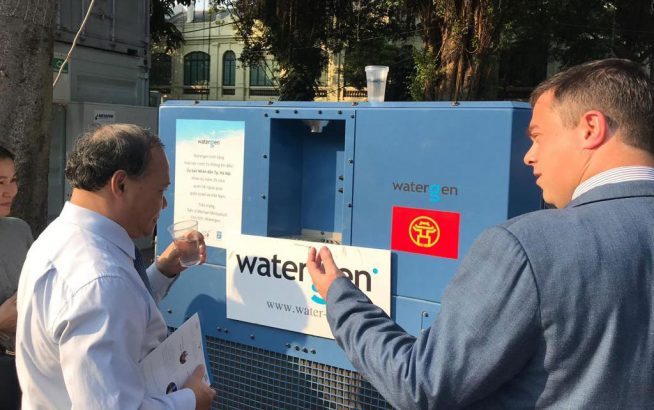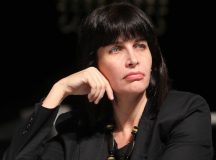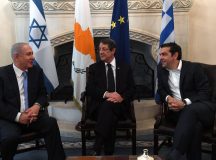Haim Shweky was the cultural attaché to the Israeli embassy in Vietnam between 2018-2019. He recounts his time at the embassy and explains how ‘Israeli diplomacy is working to instill a new understanding of Israel in the global consciousness’.
In 2018-2019 I was stationed at the Israeli Embassy in Hanoi, Vietnam, as cultural attaché — a somewhat vague but nonetheless elegant title that gave me what in journalese is called ‘access’. Observing the Israeli Diplomatic Mission at work, I saw how technology developed in the desert was helping the people of the tropics, how ‘hi-tech’ was raising up those of low means. What Israel receives in return for this material and technical aid is friendship — which counts for much in a world often unfriendly, if not hostile, towards the Jewish State. Mutual peace and prosperity (which are often related) is the supreme end.
The following is excerpted from a forthcoming book about those experiences.
*
One of the geopolitical objectives of the Israeli Diplomatic Mission is to garner as many allies abroad as possible. This means befriending even a small, politically and economically developing, landlocked country such as Laos, a country to which the world was indifferent or unaware until the Vietnam War (which, from the reverse perspective, is called the American War in Vietnam). Countries deprived of either resources or industries, much as Israel once was, regard Israel as an example of what they themselves might accomplish. They see Israel as a unique country, Israelis as a unique nation, inheritors of a special brand of experience and knowledge, which they seek to possess. The ambassador worked with this sentiment by bringing technology and expertise developed in the first world to those societies still bestriding the third and the second. He sought to raise the standing of his own country by raising the standard of living in others. His was a practical and humane effort. Israel hopes that these investments will improve the livelihoods of people ‘on the ground,’ as well as securing the goodwill and friendship of those ‘on high’.
Finding themselves before a representative of Israel some are keen to make a censorious or disapproving remark (which often bear the simplicity of a protestor’s placard). The Ambassador would usually wait them out coolly without indulging their politics with heated counterargument. He bore himself always with composure. However, there are occasions when some en passant remonstrance or spot of mendacious sarcasm has to be addressed.
I recall one such occasion. We were discussing the challenges of maintaining equilibrium in the Mekong River, employer and provider to many thousands of riverine peoples throughout South East Asia. One young scientist, having concluded speaking about one river, began pronouncing upon events west of another, that is, the Jordan. He also spoke spiritedly of Gaza. Clearly viewing Israel as the principle belligerent of the Middle East, he asked what Israel was going to do to prevent another ‘outbreak’ of war. To such a charge, which effectively allocates the full measure of blame on Israel, the ambassador has a neat and clever reply.
It begins with an Arabic maxim, true anywhere and always: il-mayy: arkhas il-mawjudāt, u-atman il-mafqudāt. ’Water: the cheapest when it’s around, the most expensive when it’s not.’ Mayim, mayy has been the major catalyst of war in the desert since pre-biblical times, and is a source of existential conflict which persists into our own day. The ambassador reminds his interlocutor of this fact. He then recalls Israel’s leadership in desalination, water recycling, drip-irrigation, relieving drought, and converting grey to fresh water. The gist of his case: ‘Israel,’ he would say, ‘has already prevented numerous wars.’
And she continues to do so. The Blaustein Institutes for Desert Research, based at Ben-Gurion University, is working to retard, and ultimately reverse, desertification. (The Negev composites nearly half the land mass of Israel proper). Their success is little less miraculous than Moses striking with his staff the stone and coaxing water therefrom.
In a place where water is expensive and dear, technology such as drip-irrigation makes the best use — as the name implies — of each gemlike droplet. Each plant receives just the nutrition it requires, at just the ideal time, like a doted upon young spruce. (This process has since been brought to a pitch of exactitude and precision by computer synchronisation.)
Dismiss the phrase ’making the desert bloom’ as ‘Hasbara’ if you wish, but one must admit, viewing the shuks, or markets, brimful of produce and dairy, that this is just what Israel has achieved. And now she is showing other arid countries how to milk and honey their way to a similar triumph over the elements (sometimes literally, as in the experimental dairy farm in Laos).
The rice grain is to Vietnam what the chickpea is to Israel and Palestine. Fluffy (cơm); sticky (Xôi); in noodle form, such as vermicelli (viscous delicious, or, if you rather, gummy yummy), used for wrapping the renowned nem in spring rolls; as a cakelike bun (bánh); as porridge, if rice is not incorporated into the main dish, it invariably accompanies one. (The etymology of the word for rice, ‘sustainer of humankind,’ makes ‘staple of life’ seem somehow paltry.)
In 2018, Israel held a ceremony in Hanoi Square, at which was revealed a vertical rice wall. Vertical Farming is a new industry which seeks to meet the food demands of the ever-more densely populated urban environment. To the question of how to farm in the midst of a city, where space is ever shrinking and ever less affordable, and where your ‘home garden’ likely consists of a potted plant on the window sill, the Israeli answer was: farm upward.
More than ‘thinking outside the box’, this was to dissemble the box, and construct the pieces in new form. Revolution is an abused term, but, I believe, applicable here without risking the charge of hyperbole.
That same year, Israeli ‘can do’ was brought to Can Tho, a southern-situated Vietnamese city smooching the lips of the Mekong River, where a program was initiated by the Israeli Embassy for developing the city, from the literal ground to the imagined skies — from farming and agriculture, to energy, to higher education.
Israeli ‘know how’ has become something of a platitude. Her international reputation as hi-tech hub and dynamo of innovation is viewed with some amusement by the sandalled and bristly-faced Israeli who, with a sort of mocking of the collective self, can be heard to flippantly self-reference the ‘start-up nation’ and make mock mention of ‘Israeli genius’. But the Israeli never quite gainsays the claims.
For her supporters, Israeli technological success is a source of vicarious pride; for her adversaries, a fact resented, resisted, but recognised, and doubtless much envied.
The relationships Israel has nurtured in plots overseas are now finding fertile ground in her own backyard. The prospect for material and social boons, as well the payouts of increased tourism, is making cooperation with Israel too enticing to resist today for many regional states. This inducement is proving strong enough in some to counter the populist politics, embedded anti-Semitism, and religious intimidation that have long acted as barriers to harmonious affairs with ‘the Zionist Entity’.
Israeli diplomacy is working to instill a new understanding of Israel in the global consciousness, drawing nations and peoples in Israel’s direction, forging new partnerships for mutual peace and prosperity.




































